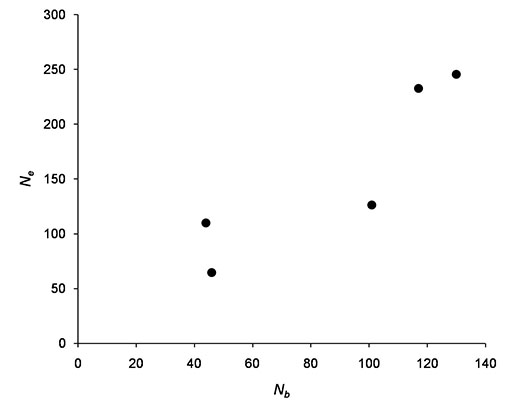
Ecological Archives E096-089-A2
Jacquelyn L. A. Wood and Dylan J. Fraser. 2015. Similar plastic responses to elevated temperature among different-sized brook trout populations. Ecology 96:1010–1019. http://dx.doi.org/10.1890/14-1378.1
Appendix B. Cape Race trout population census size (N) and the effective number of breeders (Nb) for 2011, and the relationship between Nb and Ne for five CR populations.
Table B1. Cape Race trout population census size for 2011 as well as the effective number of breeders (Nb).Nbreported is the weighted harmonic mean of point estimates across cohorts within a population. The range of point estimates are in parentheses. See Wood et al. 2014 for the 95% CI for each individual cohort.
Population |
2011 N (95% CI) |
Nb |
C |
Sample size |
Freshwater |
5385 (5076–5743) |
101 (81–452) |
3 |
45, 95, 114 |
Still There By Chance |
1405 (1211–1696) |
18 (7–72) |
3 |
93, 42, 40 |
Whale Cove |
735 (626–936) |
44 (35–87) |
3 |
66, 48, 108 |
Ditchy |
179 (132–265)a |
29 (26–34) |
2 |
26d, 35d |
Upper OuananicheBeck |
3835 (3355–6269) |
135 (93–231) |
3 |
67, 36, 93 |
Watern Cove |
8416 (7225–10255) |
130 (119–137) |
3 |
59, 96, 133 |
Lower Blackfly |
1731 (1148–2238) |
45 (30–64) |
3 |
46, 54, 52 |
Cripple Cove |
2412 (2231–2632) |
46 (28–101) |
3 |
80, 76, 71 |
C = number of cohorts sampled. Unless otherwise stated; cohort sample sizes screened at microsatellite loci are listed in this order (3 = 2009, 2010, 2011; 2 = 2010, 2011; 1 = 2011).
a Schnabel method used for N estimation.
b 2010 and 2011 cohorts, respectively.
Fig. B1. The relationship between the weighted harmonic mean Nb and Ne for five CR populations (Whale Cove, Watern Cove, Freshwater, Cripple Cove, and Bob's Cove; Wood et al. 2014) for which detailed life history data were available (Pearson's r = 0.90, p = 0.039). Ne was calculated using methods outlined in Waples et al. (2013).
Literature cited
Schnabel, Z. E. 1938. Estimation of the total fish population in a lake. American Mathematical Monthly 45:348–352.
Waples, R. S., G. Luikart, J. Faulkner, and D. Tallmon. 2013. Simple life history traits explain key effective population size ratios across diverse taxa. Proceedings of the Royal Society B: Biological Sciences 280: (1768).
Wood, J. L. A., S. Belmar-Lucero, J. A. Hutchings, and D. J. Fraser. 2014. Relationship of habitat variability to population size in a stream fish. Ecological Applications 24:1085–1100.